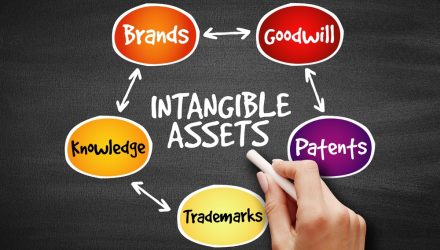Companies often have two forms of assets: tangible and intangible. Tangible assets exist as the assets found on company balance sheets like property, equipment, or inventory. Meanwhile, intangible assets are assets that lack physical form. They include things like patents, trademarks, and licenses.
Additionally, while absent from a company’s balance sheet, intangible assets can often drive a company’s growth and value. In fact, many companies’ value is derived primarily from these intangible assets.
See more: “Why Price-To-Book Ratio Doesn’t Reflect a Company’s True Value”
Qualcomm: A Case Study in Intangible Assets
Consider Qualcomm Inc. (QCOM), for example. Michael Mack, Associate Portfolio Manager for VictoryShares and Solutions, argues that much of the San Diego-based tech company’s value comes not from its tangible assets, but from its intangible ones. One way the company generates profits is by licensing the patented designs of its chips to other chipmakers and receiving royalties through those licensing agreements.
However, Mack added that there’s a challenge for investors trying to gauge Qualcomm’s value. The company “doesn’t have a lot of tangible assets.” So, it’s tough to gauge the firm’s value using its book value.
Mack offers a solution: measuring its free cash flow (FCF). “The good news is those royalties show up as cash flow,” he said. “So, using FCF solves this problem.”
Qualcomm was among the five largest holdings in the VictoryShares Free Cash Flow ETF (VFLO) as of December 18th.[1]
VFLO tracks an index[2] that seeks to capture profitable U.S. large-cap companies with high FCF yields.
The Index selects companies from a universe of U.S. large-cap stocks[3] by applying a profitability screen. It then selects companies with the highest free cash flow yields that exhibit relatively higher growth potential based on trailing and forward-looking metrics.
For more news, information, and analysis, visit the Free Cash Flow Channel.
VettaFi LLC (“VettaFi”) is the index provider for VFLO, for which it receives an index licensing fee. However, VFLO is not issued, sponsored, endorsed, or sold by VettaFi, and VettaFi has no obligation or liability in connection with the issuance, administration, marketing, or trading of VFLO.
Notes
[1] https://advisor.vcm.com/products/victoryshares-etfs/victoryshares-etfs-list/victoryshares-free-cash-flow-etf
[2] The Victory U.S. Large Cap Free Cash Flow Index
[3] The Victory U.S. Large Cap Free Cash Flow Index’s starting universe is the VettaFi 1000 Index, which consists of market cap weighted U.S. large-cap stocks.
Disclosure information
The VictoryShares Free Cash Flow ETF held Qualcomm (QCOM) at a 3.26% weight in the portfolio as of 12/18/2023.
Free Cash Flow (FCF) is the cash generated by a company that is available for distribution to investors, debt repayment, or reinvestment in the business.
Price-to-book ratio measures the market’s valuation of a company relative to it’s book value and is calculated by dividing the company’s current stock price per share by its book value per share.
Carefully consider a fund’s investment objectives, risks, charges, and expenses before investing. To obtain a prospectus or summary prospectus containing this and other important information, visit http://www.vcm.com/prospectus. Read it carefully before investing.
All investing involves risk, including the potential loss of principal. Please note that the fund is a new ETF with a limited history. The Fund has the same risks as the underlying securities traded on the exchange throughout the day. Redemptions are limited, and commissions are often charged on each trade. ETFs may trade at a premium or discount to their net asset value. The Fund invests in securities included in, or representative of securities included in, the Index, regardless of their investment merits. The performance of the Fund may diverge from that of the Index. Investments concentrated in an industry or group of industries may face more risks and exhibit higher volatility than investments that are more broadly diversified over industries or sectors.
Additional Information
Derivatives may not work as intended and may result in losses. Large shareholders, including other funds advised by the Adviser, may own a substantial amount of the Fund’s shares. The actions of large shareholders, including large inflows or outflows, may adversely affect other shareholders, including potentially increasing capital gains. Investments in mid-cap companies typically exhibit higher volatility. The value of your investment is also subject to geopolitical risks such as wars, terrorism, environmental disasters, and public health crises; the risk of technology malfunctions or disruptions; and the responses to such events by governments and/or individual companies.
The information in this article is based on data obtained from recognized services and sources and is believed to be reliable. The securities highlighted, if any, were not intended as individual investment advice.
Distributed by Foreside Fund Services, LLC (Foreside). Foreside is not affiliated with Victory Capital Management Inc. (VCM), the Fund’s advisor. Neither Foreside nor VCM are affiliated with VettaFi.
20231222-3296107

